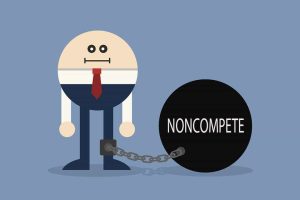
Once a provision applying only to a corporation’s most valuable rainmakers, noncompetes are now used when hiring low-wage staff like fast-food workers, warehouse employees, and even dog sitters. One in six workers without a college degree has signed one. By including them in employee contracts, employers can threaten workers with litigation to constrict wages and mobility.
Noncompete agreements hamper our economy in larger, less tangible ways. There is very compelling data indicating that they reduce employee motivation, entrepreneurship and sharing of knowledge—the very foundation of innovation and economic growth.
At the very least, states should ban noncompetes for all low-wage workers, for any employee in occupations that promote public safety and health (like physicians and nurses), and for all workers who are laid off or let go without cause. Looking forward, research even suggests that noncompetes should be banned for all workers, regardless of skill, industry or wage; they simply do more harm than good.
Last year when President Obama was still in office, the White House proposed a Call for Action urging states—as well as Congress—to resist the expansion of noncompetes. Vice President Joe Biden was a major player in that push, collecting testimonies of workers harmed by noncompetes: these included a teacher who couldn’t take a summer job selling pet food because of her job the previous summer; a 56-year-old Connecticut salesman forced to retire due to a noncompete clause; an Ohio woman who fled an abusive marriage and then got slapped with a lawsuit for taking an entry-level sales job with a new company.
Laws regarding noncompetes are different from state to state, which makes it possible to analyze the impacts of such contracts on wages, competition and labor mobility. Evidence shows that wages in states that enforce noncompetes are 10% lower than in states that limit their use. A recent Treasury Department report confirmed that “by reducing workers’ job options, noncompete agreements force workers to accept lower wages in their current jobs, and may sometimes induce workers to leave their occupations entirely, forgoing accumulated human capital.”
Workers stuck in noncompete agreements cannot rely on outside offers and free-market competition to fairly value their abilities. In the absence of incentives to raise wages in-house, companies simply let salaries plateau. And while noncompete restrictions place hardships on all workers, their impact is particularly sever for women, who are already restricted by other mobility constraints, including family obligations, the need to balance multiple careers, and the challenges of re-entering the job market after family leave.
California and Massachusetts provide an insightful case study within the high-tech industry. California voids all noncompete agreements. Massachusetts, on the other hand, enforces noncompetes. Both California and Massachusetts saw an early boom of economic growth within the high-tech market, but California’s Silicon Valley has continued growing, while Massachusetts has stalled.
Unlike Silicon Valley workers, employees in Massachusetts tech companies are bound by noncompete agreements, and the state’s enforcement of those contracts kept out new businesses by preventing people who typically start new businesses—experienced former employees—from staying in the area. On the other hand, entrepreneurial activity flourished in Silicon Valley; thanks to California’s refusal to enforce all noncompetes (including those from other jurisdictions), it remains the world’s most thriving tech hub.
Recently, reforms have been pushed through in other states like Colorado, Oregon, Illinois and New York. Hawaii passed a law in 2015 barring noncompetes in the tech industry.
On the Federal level, Congress introduced two bills last year—the Limiting the Ability to Demand Detrimental Employment Restrictions Act (Ladder Act) and the Mobility and Opportunity for Vulnerable Employees Act (MOVE Act).
The smartest companies already see the damaging effect of post-employment restrictions. Companies that have low turnover run the risk of becoming stagnant and short-sighted. In fact, dependence on noncompetes (as an alternative to active recruitment and retention) creates a market for lemons—a business will end up with employees who stay in spite of their discontent.
Savvy leaders regard departing employees as alumni, rather than shunned exes in a bad divorce. But too many other employers have become increasingly litigious against their former employees, depending on noncompetes rather than positive incentives to keep the best talent and beat out competition.
The freedom to move in the job market not only promotes workers’ choice, equality and income growth but also creates the competition that drives innovation, entrepreneurship and economic growth across the board. If we want a thriving free market, we must stop shackling workers to the first business that offers them a job. Let everyone compete!




